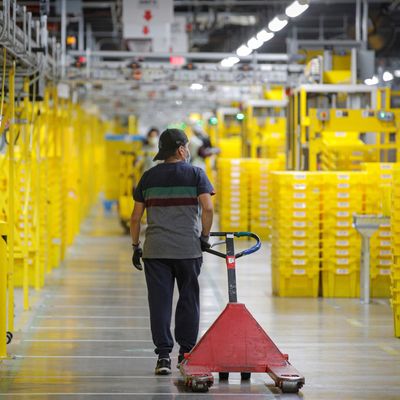
With two sentences, the National Labor Relations Board rejected Amazon’s last attempt to prevent a union election from going ahead in Alabama. The e-commerce giant cannot force warehouse workers to vote on a union in person, the NLRB ordered on Friday. Because there is a deadly pandemic, workers will be able to cast their votes by mail. Voting will begin on Monday and continue through March 29, and shortly thereafter, the Retail, Wholesale, and Department Store Union will find out whether it has toppled Goliath.
Should the RWDSU win its election, the Amazon fulfillment center in Bessemer, Alabama, will be the company’s first unionized warehouse in the U.S. The vote is arguably the most consequential moment for the labor movement in decades. Not only has the union challenged a monopoly, it is challenging, too, the progressive claims that monopoly has made to justify its power. Amazon bet that its $15 minimum wage and the desperation of economically distressed workers would deter unionization. The RWDSU has called its bluff. The Bessemer election pits Amazon’s meager benefits against the union’s promise of future improvements: safer conditions, better pay, and reliable raises. The union also pledges something else Amazon likely fears above all — a more democratic workplace.
Which helps explain Amazon’s desperation. Since the beginning of the pandemic, the NLRB has rejected all requests from employers across the country for in-person voting. Two Republicans even joined Friday’s finding against Amazon. The company’s gambit was doomed from conception — the fact that it tried anyway suggests it is not so confident about the outcome of its frantic anti-union campaign.
The RWDSU’s president, Stuart Appelbaum, praised the board’s decision. “Amazon’s blatant disregard for the health and safety of its own workforce was demonstrated yet again by its insistence for an in-person election in the middle of the pandemic,” he announced in a statement. Amazon, he added, must “start respecting its own employees and allow them to cast their votes without intimidation and interference.”
Intimidation and interference have shaped Amazon’s entire response to the union drive. Workers say the company hounds them with texts, Facebook ads, and endless pamphlets about onerous dues and the interfering habits of unions. There are even anti-union flyers in the warehouse bathrooms, the Washington Post reported. “They got right in your face when you’re using the stall,” one man complained. An Amazon anti-union website warns workers that they will have to pay dues to the RWDSU if the union wins an election. “BE A DOER, NOT A DUE’R,” it beseeches in giant text. “IF YOU’RE PAYING DUES … it will be RESTRICTIVE meaning it won’t be easy to be as helpful and social with each other. So be a DOER, stay friendly and get things done versus paying dues.”
Amazon’s website doesn’t make much sense even as propaganda. There’s no obvious correlation between union dues and workplace civility, and the claim is particularly strange in the context of a fulfillment center. Warehouse workers interviewed by Intelligencer throughout the pandemic have said they typically have little time to socialize; they have quotas to meet and, now, social-distancing standards to observe. Amazon’s other tactics feature commonly in anti-union campaigns. The company has repeatedly pulled workers into captive-audience meetings, mandatory gatherings where managers warn against unionization. The anti-union website urges employees to “take back” union-authorization cards, as did Hearst Magazines when its editorial staff unionized with the Writers Guild of America, East.
Amazon said in a statement: “Our goal is for as many of our employees as possible to vote and we’re disappointed by the decision by the NLRB not to provide the most fair and effective format to achieve maximum employee participation. Even the National Labor Relations Board recognizes that the employee participation rate for its own elections conducted with mail ballots is 20-30% lower than the participation rate for in-person voting. Amazon proposed a safe on-site election process validated by COVID-19 experts that would have empowered our associates to vote on their way to, during and from their already scheduled shifts. We will continue to insist on measures for a fair election that allows for a majority of our employee voices to be heard.”
Because American labor laws are weak and favor employers, corporations like Amazon can get away with a great deal. (That may soon change: The PRO Act, reintroduced by House Democrats on Thursday, includes a provision that would make captive-audience meetings unlawful.) Amazon can’t prevent an election from taking place, but it can delay the process and try to discourage employees from voting. The long and violent history of organized labor in America is replete with employers like Amazon. It’s not the first company to try to punish workers with injury or even death for unionizing.
There’s an additional bleak quality to Amazon’s anti-union drive: When protests over police brutality engulfed major American cities last summer, the company touted its support for #BlackLivesMatter. (Workers were not that impressed at the time.) But in Bessemer, Amazon tried everything it could to keep a mostly Black workforce from voting. #BlackLivesMatter unless they want livable wages, more bathroom breaks, or universal paid sick leave.
The NLRB’s ruling provides some catharsis and shields Amazon workers from a vengeful, powerful boss. Over the next three weeks, they will finally have a chance to take their future into their own hands.






























